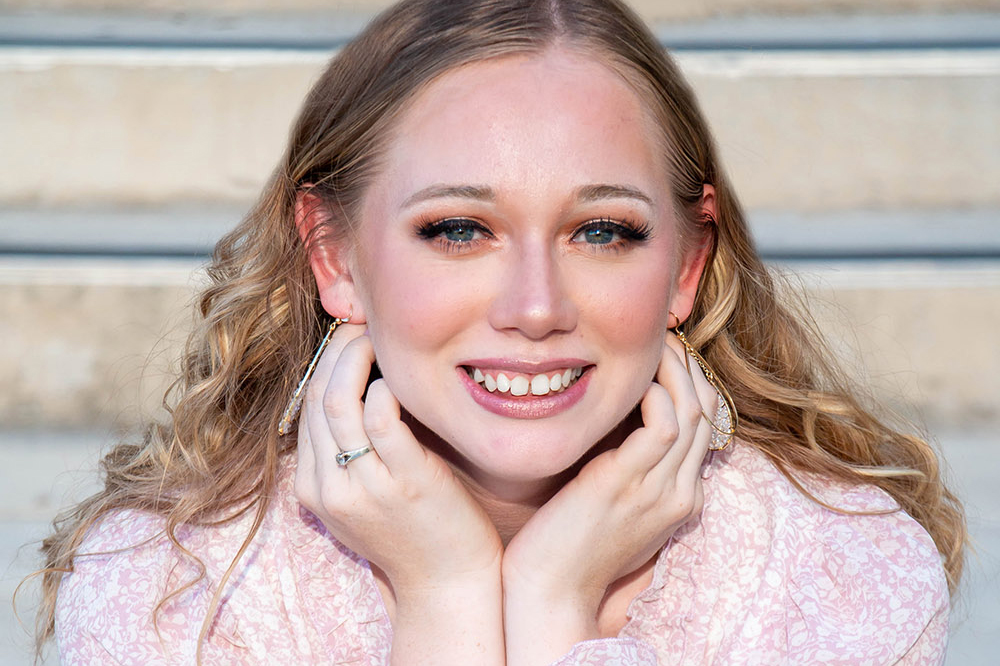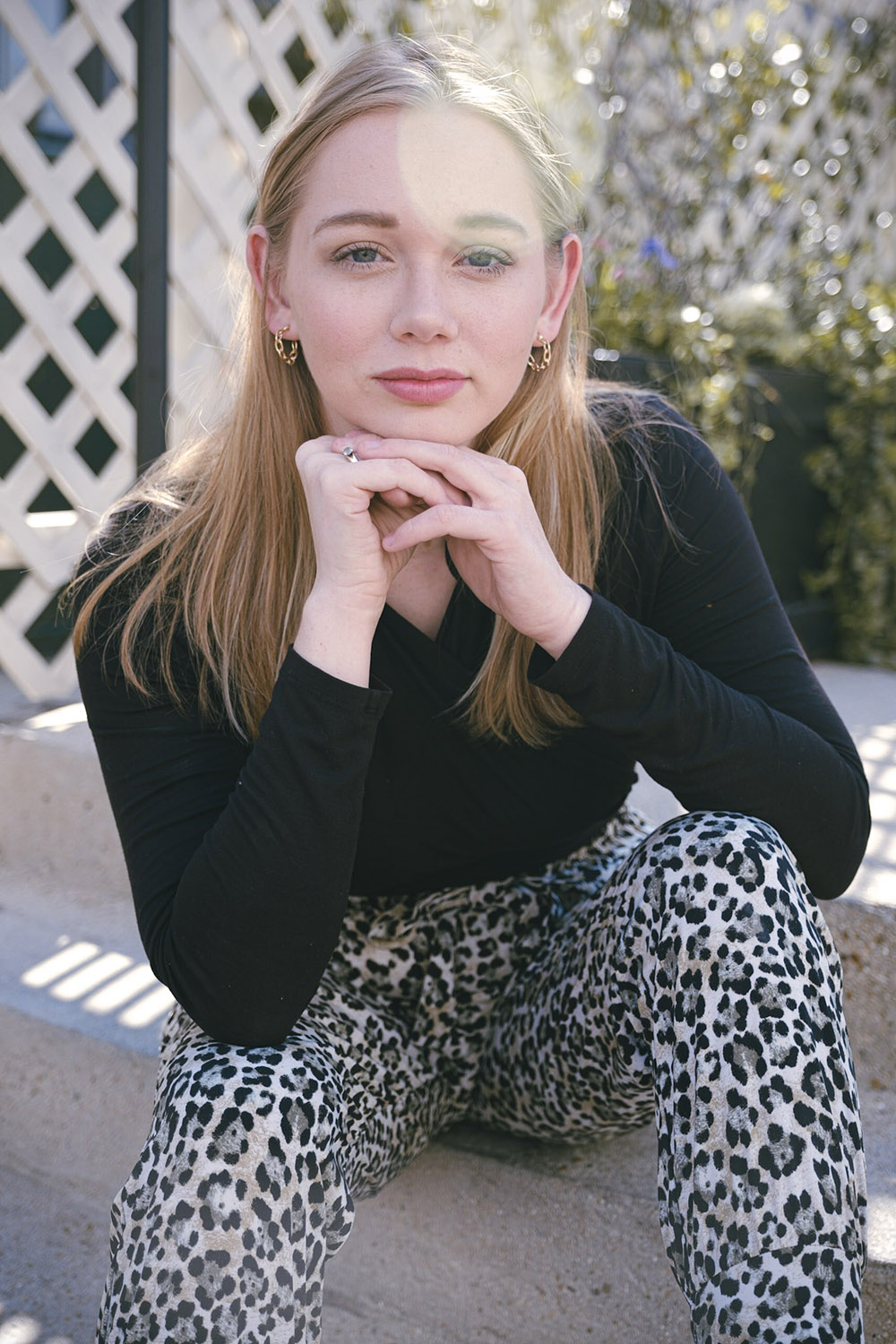
This College of Education student will earn her master’s degree at only 21 years old with plans to form bilingual schools.
Mikayla Langham climbs mountains.
“I'm the type of person who once I have my mind set, I go for it,” Langham said. “Even if the process is super difficult, or harder than I thought it would be, I go for it.”
It is through this determination that she – quite literally – ascends summits. While she was earning her master's in bilingual education and ESL (English as a Second Language), Langham took a selfie at the top of Machu Picchu during her summer courses in 2022.
“These summer courses are intense,” said Comfort Pratt, associate professor of Bilingual Education and ESL in the Department of Curriculum and Instruction. “They are four weeks, so you have to really be on top of it and Mikayla still managed to do everything she was supposed to do. She would Skype and attend seminars through Zoom from some point on the mountain.”
This is a great example of the person Langham is: One who consistently pushes herself to the limit through discipline and hard work to overcome rocky roads.
Which is exactly how she will obtain her master's degree this May at 21 years old.

“I've been teaching graduate students since 2004, and during all these years at Texas Tech, she's the youngest student I've ever had in a graduate program,” Pratt said.
Langham's had never done research before, the basis of her master's program. She rounded that learning curve with precision thanks to her willingness to ask Pratt questions.
Her biggest challenge had nothing to do with curriculum. Last September, Langham was in a car accident where she was T-boned by a dump truck.
She suffered a traumatic brain injury.
“I feel like I've been through so much,” Langham said. “I remember talking to Dr. Pratt, and telling her, ‘I don't know if I will be able to do my very last semester' and she was like, ‘No, Mikayla, you have accomplished so much and this is not going to stop you. Just take this as another challenge you're going through and keep going.'”
Through encouragement from Pratt and a Texas Tech counselor, Langham was able to push through her injuries and doubts to complete her final semester of her master's degree.
“Mikayla has a maturity of spirit, despite her young age,” Pratt said. “That is why I think she is a very special student.”
A Unique High School Experience
Langham's ambitions started at a high school called Colorado River Collegiate Academy in Bastrop, Texas.
“They accepted like 60 kids per year,” Langham said. “It was a public school, but you had to apply and do all these essays, testing and an interview where you dressed up. I remember because it was a new idea to me.”

Langham donned her new interview duds, was accepted and began an accelerated track that would enable her to complete her core college courses during high school.
That meant Langham took her first college class when she was 15 years old.
“This school specifically was something new they were doing in Bastrop.” Langham said. “I was part of the second graduating class.”
There were not a lot of extracurriculars offered at Colorado River Collegiate Academy while Langham attended. Some of her favorite memories were staying up all night with her friends to study for college finals.
“We had fun,” she said. “It was a lot of stress at that age, but we had a confidence within each other like a community.”
Together, they swerved through challenging learning curves and by the time she graduated at age 17, Langham had earned her associate degree.
“People think I must be some sort of genius,” Langham said with a laugh. “I tell them, ‘No, I promise you, I'm not a genius. I just work hard to reach my goals. I don't ever let something like age discourage me from the things that I want to do.'”
A Change in Direction
By age 19, Langham earned her bachelor's degree in sociology from Texas State University. It was during that time she had opportunities to visit Mexico with her church Misión Cristiana Internacional LIDS.

Even though her mother is Hispanic and the older generations of that side of her family are fluent in Spanish, Langham never learned the language as a child. But that began to change during her frequent mission trips.
As she broke through the language barrier, she discovered she wanted to help others do the same. Her newfound passion would change her career field from science to education.
“I noticed there was a need for more ESL services,” she said. “I really believed there'd be more opportunities for the pastors in Mexico to be able to preach if they were bilingual.”
The problem is, in order to get quality education in Mexico, Langham said K-12 students have to pay. The more they pay, the better education they receive.
If that was the case in the U.S., Langham would not have had near the opportunities she experienced at Colorado River Collegiate Academy.
“I grew up in a low-income family,” she said. “My dad is actually a 100% disabled veteran.”
So, Langham decided to take action. Instead of waiting around for someone older and more experienced to tackle the problem, she and her friend took it upon themselves to create an ESL ministry called Pablo in 2019 that taught more than 20 pastors and future pastors English.
“I was in charge of the curriculum,” she said. “My friend arranged and taught the classes.”
The very next year, the COVID-19 pandemic put their ESL outreach on pause as Langham said Mexico “really buckled down.” Unfortunately, the Wi-Fi signal was too weak for the classes to continue online.
But Langham was not discouraged for long. Several Mexican immigrants and business owners heard about her ministry work through a mutual friend and reached out to see if she could help their children maintain their native Spanish language.
“The parents felt like the educational system they were currently enrolled in had no options when it came to the language programs offered,” she said. “They felt the kids weren't getting the academic Spanish they felt they needed.”
That knowledge gave Langham a mission worth devoting her life to: creating resources for Spanish natives and other children to leave school biliterate, multicultural and multilingual.
She began to ask questions, such as: How do we create a community educated in the benefits of bilingualism? How do we provide the support our culturally and linguistically varied students need?
“That was my initiation into realizing I had a desire to teach and open doors to languages and the importance language has in every field,” Langham recalled.
Around this time, her road became a little rocky. Not long after Langham's high school graduation, she became a caretaker for her dad, who experienced a shortage of veteran resources after the COVID-19 pandemic. If pursuing a master's degree meant leaving him, she refused.
“Not only does my dad need me, but I need my dad,” she said. “I also need my church family and the support system I built here in Austin.”
Langham is not one to give up, though, so she kept searching for a flexible online program that would work with students' needs.
That is how she discovered Pratt and the bilingual education and ESL master's program at Texas Tech. Langham called her right away.
“When I talked to Dr. Pratt, she was so knowledgeable,” Langham said. “She convinced me that I could take this step forward.”
Taking on Texas Tech
Pratt remembers how impressed she was when she spoke with Langham about all her accomplishments at such a young age.

“Right from the beginning, we had this connection,” Pratt said. “We started talking about how she did everything so quickly to get to that point. She has the capacity to do more than the norm and be happy about it at the same time.”
Pratt even had to encourage Langham not to overdo it after she enrolled in 2021. She advised her to only take two courses a semester, since the students in her program are all K-12 teachers who work until 4 or 5 p.m.
Such is the case for Langham. In the past three years, she has taught at three different schools. Her most recent position is a first and second grade math and science teacher role on the founding team of a charter school in Bastrop called Compass Rose Harvest.
She is on a leadership plan there with the aim to become a principal one day.
“While it's not a bilingual school, my kiddos and I have created such a culturally diverse classroom,” she said. “We start our morning meetings off in Spanish and we have Spanish songs and phrases we use. So even though my instruction is in English, we're building a desire to speak another language.”
Langham has noticed this steady language incorporation empowers her Spanish-speaking students.
“My kiddos that speak Spanish – they know it's a superpower,” she said. “They know it's something they need to keep bettering and improving.”
That feedback, combined with direction from Pratt, helped Langham form her ultimate dream: founding a dual language school in Texas, as well as an ESL school in Mexico that uses hands-on and project-based learning.
“I remember thinking, ‘That's impossible,'” she said. “But I have an idea of what it looks like and the steps I need to accomplish to get there.”
Langham has slowed down that timeline by not rushing into a doctorate program after her graduation in favor of an academic break (much needed after her car crash). But her end goals remain the same, and Pratt could not be prouder.
“She has not only completed the program, but has grown a lot as well,” Pratt said. “I know she's going to do great things. I have a lot of hope for our profession knowing that we have people like Mikayla out there who will make a huge difference.”
Even long after Langham walks across the graduation stage, Pratt will keep a picture of her to remember her.
Not of her in her cap and gown, but at the top of Machu Picchu – a reminder of the tenacity Pratt witnessed firsthand and hopes to share with students to come, along with Langham's words of advice:
“Don't let anyone tell you no, or tell you that you can't do something, especially if you know you can. Don't let other people tell you, ‘That's not realistic, go for something more realistic.' No. Just go for it.
I'm not saying everything is possible. But if you set reasonable goals and points within the timeline, it is possible.”
